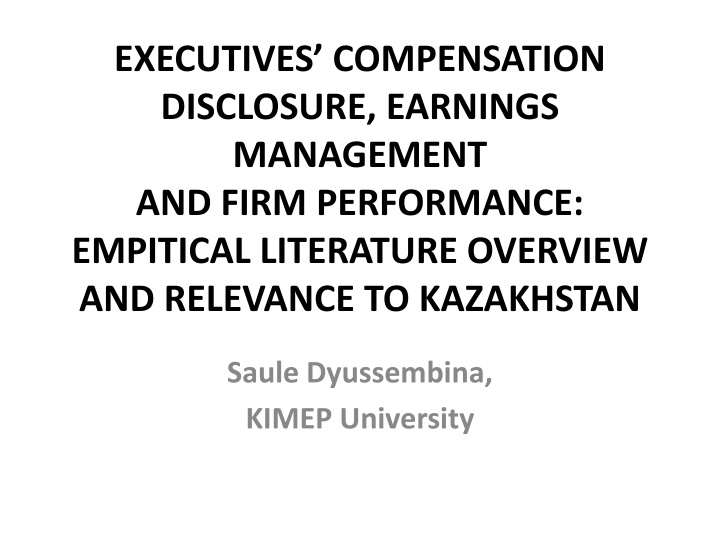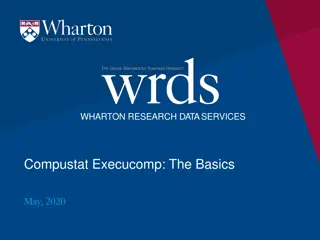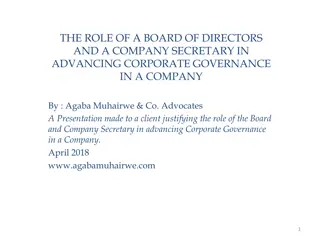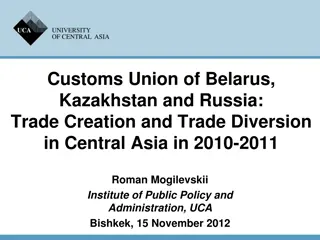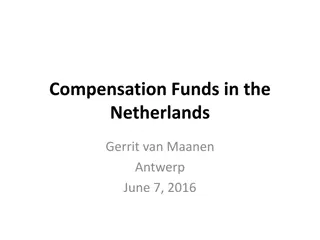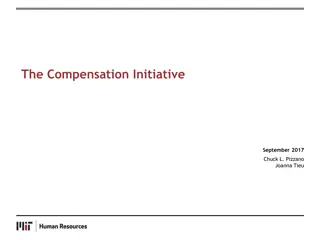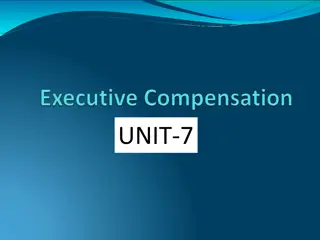Corporate Governance and Executive Compensation: Insights for Kazakhstan
This overview explores the relationship between executives' compensation disclosure, earnings management, and firm performance, with a focus on the relevance to Kazakhstan. It discusses theoretical frameworks, issues in the Kazakhstani corporate governance landscape, and research findings on executives' influence on their compensation. The context of controlling shareholders in emerging markets is also examined in relation to firm performance. The study highlights the importance of transparency in compensation practices for effective corporate governance.
Download Presentation

Please find below an Image/Link to download the presentation.
The content on the website is provided AS IS for your information and personal use only. It may not be sold, licensed, or shared on other websites without obtaining consent from the author.If you encounter any issues during the download, it is possible that the publisher has removed the file from their server.
You are allowed to download the files provided on this website for personal or commercial use, subject to the condition that they are used lawfully. All files are the property of their respective owners.
The content on the website is provided AS IS for your information and personal use only. It may not be sold, licensed, or shared on other websites without obtaining consent from the author.
E N D
Presentation Transcript
EXECUTIVES COMPENSATION DISCLOSURE, EARNINGS MANAGEMENT AND FIRM PERFORMANCE: EMPITICAL LITERATURE OVERVIEW AND RELEVANCE TO KAZAKHSTAN Saule Dyussembina, KIMEP University
Theoretical background Jensen and Meckling, 1976 Agency Theory Information asymmetry Arm s-length contracting between executives and boards of directors Optimal contracting theory Bebchuk and Fried (2006) Managerial power theory Executives control over the process of design of their compensation packages Proposed solution: increased transparency
Relevance for Kazakhstan IFC Survey Corporate Governance Practices in Kazakhstan (2016): high interest on corporate governance from companies High concentration of ownership No regulatory requirement to disclose the information on the size and the nature of executives or CEO s remuneration publicly IAS 24 on Related Party Disclosures: total size of compensation, without any specifications of the dollar values and the types of the benefits in the compensation packages of separate executives.
Executives compensation and firm performance Bebchuk and Fried (2004, 2006): top managers exercise their power over the decisions of the boards of directors to assign their own compensation plans. Brick et al. (2006): there is relationship between the compensation level of CEO and that of directors => rejection of the concept of arm s length relationship. Tosi et al. (2004) emphasize the role of CEO s charisma in the process of their compensation arrangement. Excessive compensation of managers is not related to firm performance, as reported by Brunello et al. (2001), Brick et al. (2006),
General framework Company performance Corporate governance Managers Shareholders compensation
Emerging markets context controlling shareholders (Firth et al, 2008) Controlling shareholders + + + Executives compensation Firm performance Cheung et al. 2011 Controlling shareholders Quality of corporate governance Firm s market performance
Orazalin et al., 2015; Orazalin et al. 2016: weak impact of board characteristics on firm performance in Russian banking and oil and gas sectors in Asian region (Lin and Wu, 2014; Shen and Chih, 2007), in China (Chan, 2015), Jordan (Al-Fayoumi et al., 2010), India (Sarkar et al., 2008) : the role of strong corporate governance in ensuring good quality earnings reporting Hypothesis: corporate governance mechanisms are characterized with weak abilities to exert control over executives compensation setting process Hypothesis: top managers compensations are not tied to the performance of companies in Kazakhstan.
Possible substitution of firm performance by earnings management Earnings management Corporate governance Managers Shareholders compensation
Literature overview Baber et al. (1998), Sun (2014): managers increased propensity to manipulate earnings when their compensation is tied to reported performance of companies Cornett et al. (2009): the positive relationship between pay- for-performance sensitivity and earnings management in the largest U.S. banking corporations. Adut et al. (2003): companies with high discretional accruals have weak association of compensation with future returns; a worse setting for the use of compensation-based contracts with managers. Li et al. (2016) report about the existence of some tolerance level of accepted earnings management: executives receive rewards for moderate-level earnings manipulations and are penalized for inordinate earnings management.
Firms characteristics E.g. Kwon and Yin (2006): high-tech vs. low-tech companies Earnings management Corporate governanc e Shareholder s Managers compensatio n
Baker et al. (2003), McAnally et al. (2008): news manipulation to decrease stock option exercise price. Laux and Laux (2009): increase in CEO equity incentives does not necessarily increase earnings management under the presence of effective controlling mechanisms in corporate governance Earnings managemen t Corporate governance Managers Shareholders compensation
Recent changes in the developed markets Sarbanes-Oxley (2002). Cohen et al. (2008) substitution of accruals-based earnings management by the real earnings management practices after introduction of Sarbanes-Oxley Compensation recovery. Chan et al. (2015): decline of manipulation with earnings in the financial reports after introduction of compensation recovery
Solutions proposed by academicians Ibrahim and Lloyd (2011): inclusion of non- financial performance measurements to executives compensation Bebchuk and Fried (2006): increased transparency over executives compensations
Hypothesis Earnings management Executives compensation Firm performance Corporate governance
